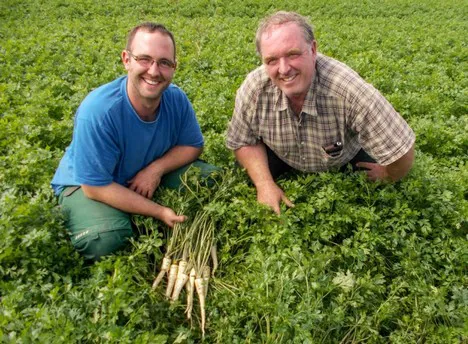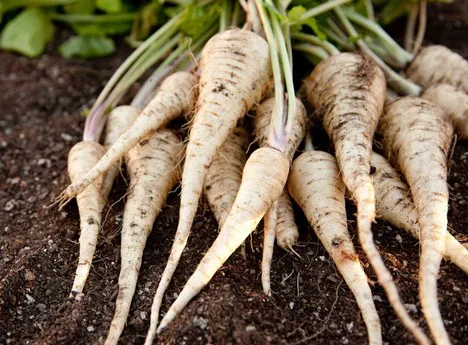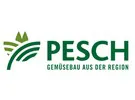Marketing of winter crops traditionally approaches its peak in December. However, despite good yields, demand is currently noticeably lacking, Sebastian Pesch, junior manager of the vegetable farm of the same name in Bornheim, tells us. "So far, it has mostly been too warm outside, which is why winter vegetables have generally been less in the consumer's focus. I also suspect that the presence of imported goods from southern Europe plays a role. Normally, demand increases distinctly at the beginning of December, but right now it is still rather meager, i.e. not even half of the normal demand. Experience shows that business will 'explode' again in the week before Christmas."

Sebastian (l) and Norbert Pesch of the Bornheim-based vegetable farm of the same name.
The Bornheim vegetable farm's seasonal range currently includes root parsley, parsnips, pointed cabbage and Chinese cabbage. The majority is marketed directly to regional food retailers, and the wholesale trade is also supplied with crisp, fresh field vegetables. "95 percent of our area is irrigable, which is why we were able to achieve good yields overall for our stored products. However, the prolonged heat in the summer has led to increased electricity costs for the cold storages. The current prices of the stored vegetables are still good, so fortunately we can still cover our costs," says Pesch.

Root parsley from the Bornheim fields
In line with the circumstances, the vegetable farm will fundamentally change its cultivation plan in the new year. Pesch: "We will produce less lettuce, mini-romaine and cauliflower in the early period due to increased planting costs. As a result, an expansion of the range or area is out of the question for the time being. We also had to stop our lamb's lettuce cultivation early this year. That was a bit fortunate, we have to say in retrospect, as the current situation is characterized by excess volumes."
Despite everything, Pesch looks back on a satisfactory open ground season so far. "Sales of our outdoor lettuces were a given, only prices were rather disappointing, especially before the summer vacations. In the longer term, we are finding that mini romaine is increasingly displacing lettuce, as it lasts longer and comes in smaller portions."
Tightening fertilizer regulations
Apart from all the ubiquitous cost increases and challenges, the young farmer is concerned by the high nitrate contamination of agricultural land in Germany as well. "We can assume that by the end of the year, 80 to 95 percent of the land will be marked as red. This means that 20 percent less fertilizer may be applied in these areas, which in turn will have devastating consequences for certain crops, first and foremost nitrogen-intensive products such as cauliflower and broccoli. This will eventually affect prices in the trade as well."
Images: Gemüsebau Pesch GbR
For more information:
Sebastian Pesch
Gemüsebau Pesch GbR
Neuer Heerweg 5
53332 Bornheim
Tel.: +49 2222 6489537
Fax: +49 2222 9271680
E-Mail: info@gemuesebau-pesch.de
www.gemuesebau-pesch.de
